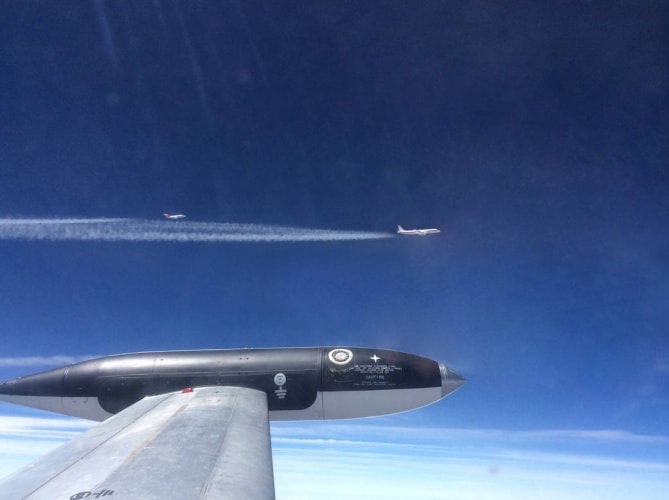NASA says biofuels could massively reduce jet engine particle emissions
A study from NASA has found that jet engines running on biofuels can reduce particle emissions by between 50 and 70 per cent.

(Credit: National Research Council of Canada)
Working alongside agencies from Germany and Canada, NASA carried out a series of flight tests in 2013 and 2014 using a four-engine DC-8 aircraft. Flying as high as 40,000 feet, the DC-8 burned a 50-50 blend of aviation fuel and an alternative renewable fuel of hydro-processed esters and fatty acids, produced from camelina plant oil. The tests were part of the Alternative Fuel Effects on Contrails and Cruise Emissions Study, or ACCESS.
Behind the DC-8, three research aircraft took turns directly trailing it at distances between 300 feet and over 20 miles, taking measurements on emissions and studying the plane’s contrails. Contrails are formed when hot jet exhaust mixes with the cold air at high altitudes, forming ice crystals around tiny particles of soot. Persistent contrails can form long-lasting cirrus clouds, which have a significant effect on the environment. According to NASA, aircraft contrails and the clouds they create have a bigger environmental impact than all aviation CO2 emissions since powered flight began.
Register now to continue reading
Thanks for visiting The Engineer. You’ve now reached your monthly limit of news stories. Register for free to unlock unlimited access to all of our news coverage, as well as premium content including opinion, in-depth features and special reports.
Benefits of registering
-
In-depth insights and coverage of key emerging trends
-
Unrestricted access to special reports throughout the year
-
Daily technology news delivered straight to your inbox










Water Sector Talent Exodus Could Cripple The Sector
Maybe if things are essential for the running of a country and we want to pay a fair price we should be running these utilities on a not for profit...